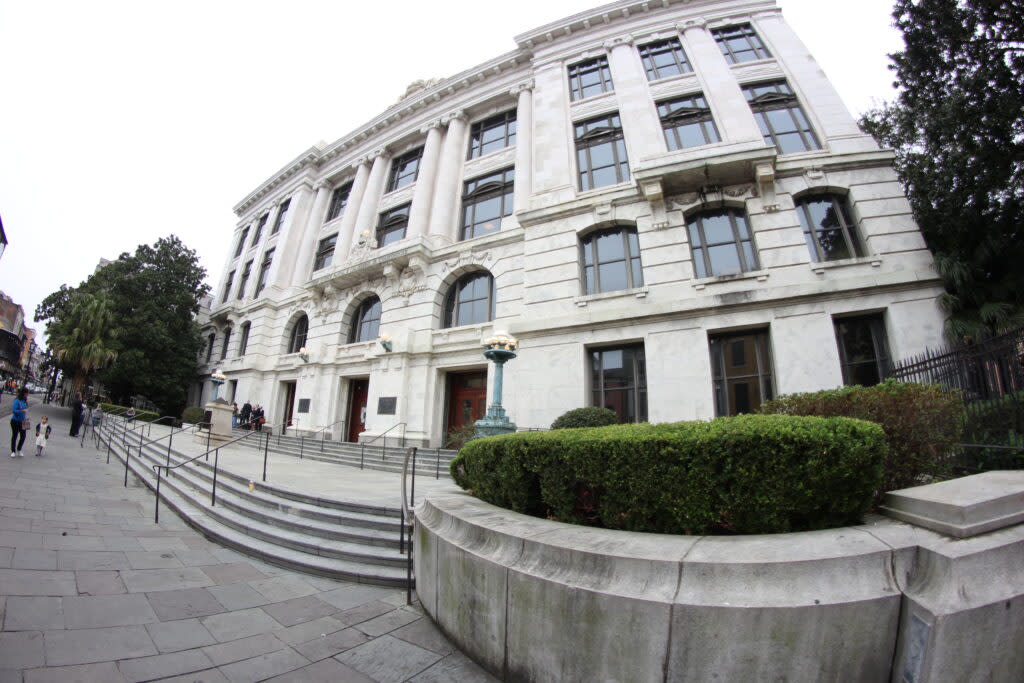Candidates sign up to run in new majority-Black Louisiana Supreme Court district

Three candidates signed up Wednesday to run for the new majority-Black seat on the Louisiana Supreme Court. (Wes Muller/Louisiana Illuminator)
Two state appellate court judges and a Baton Rouge government administrator signed up Wednesday to run for a newly-created majority-Black seat on Louisiana’s Supreme Court.
All three candidates for the court’s District 2 slot, based primarily in Baton Rouge, are Democrats.
Baton Rouge native John Michael Guidry is the chief judge for the Louisiana First Circuit Court of Appeal and the first African American to serve in that post in more than 100 years. Prior to his time on the bench, he was a state representative and state senator.
Guidry framed himself as the most qualified person for the seat. He first joined the appellate court in 1997.
“It is important to have a judge who is qualified, who is experienced, to sit on that court,” he said during a press conference at the Louisiana State Archives building in Baton Rouge.
Guidry said he doesn’t believe Louisiana Supreme Court justices should make laws from the bench. That role is for the Legislature and governor, he added.
“My job is not to legislate, but my job is to make sure that whatever laws are made are made in accordance with our constitution,” said Guidry, who also ran for state Supreme Court in 2012.
Guidry is in favor of Louisiana conducting a statewide workload study of judges to determine how many cases each state court handles. For years, a handful of legislators have pushed for an examination of how state judges use their time to see if judicial resources need to be reshuffled. So far, most judges have refused to participate in the exercise.
Guidry also said he believes state court records need to be available electronically to the public — an option not available in every parish.
“The reality of it is we need to make courts accessible, and one of the ways you can do that is with technology,” he said.
Guidry has the endorsement of a political action committee (PAC) affiliated with the Louisiana Association of Business and Industry.
Also qualifying was Marcus Hunter from Monroe, who was elected to the Louisiana Second Circuit Court of Appeal in 2021 after serving as a state district court judge for three years. He is also a former state representative.
Hunter, who is African American, was more cautious about a judges’ workload study. The original proposal for the study included timesheets for judges to record how many hours per day they worked.
“I think about the law from the moment I’m in the shower [in the morning], to the moment my head hits the pillow,” Hunter said, emphasizing it would be hard for him to quantify how much work he does per day.
Information about how much work judges might do could also be used to pit lawmakers and judges against each other, he said.
“We have to make sure in this political climate, we’re not using information to have … attacks on other branches of government for the purpose of political gain,” Hunter said.
Hunter supports centralizing and digitizing court records, but he said judges should be careful such information isn’t used to harass and embarrass people online. He is particularly wary of doxxing, when private information is collected about an individual and widely shared in an attempt to shame the person publicly.
The extent to which juvenile court records should be available also needs to be evaluated on a case-by-case basis, Hunter said.
A third candidate, Leslie Ricard Chambers, also signed up to run in the District 2 election but did not speak to reporters after she qualified for the election.
Chambers, a Black woman, is an attorney and the assistant chief administrative officer for East Baton Rouge Mayor-President Sharon Weston Broome. She previously worked for Gov. John Bel Edwards and East Baton Rouge District Attorney Hillar Moore.
The new District 2 seat on the Supreme Court includes much of the Baton Rouge area and parts of Lafayette, Rapides and Ouachita parishes. It extends from Iberville Parish to northeast Louisiana, adjacent to Arkansas.
The population of the seven Louisiana Supreme Court seats were extremely uneven until recently because their district lines had not been adjusted since 1997.
As part of a new court map adopted this spring, District 2 has been moved from the Shreveport area, where retiring Justice Scott Crichton serves, farther south to create a new majority-Black seat. Another majority-Black seat has been based in New Orleans for decades.
Black voters have been suing the state of Louisiana for allegedly disenfranchising Black residents under the old court map. It contained seven districts, only one of which was made up of primarily Black voters. Black residents make up 33% of Louisiana’s population.
With the addition of a second majority-Black seat, the new map has been expected to put that litigation to rest.
The District 2 election will take place Nov. 5. If no candidate gets over 50% of the vote, a runoff election between the top two candidates will be held Dec. 7.
The qualifying period to become a candidate in this race isn’t over yet. Candidates can also sign to participate in the election Thursday and Friday.
GET THE MORNING HEADLINES DELIVERED TO YOUR INBOX
The post Candidates sign up to run in new majority-Black Louisiana Supreme Court district appeared first on Louisiana Illuminator.

